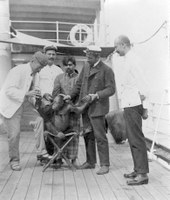Lecture by Oliver Hochadel (CSIC): "A Network of 'Exotic Animals'. The Emergence of the Global Zoo Around 1900"

Details
* THE LECTURE WILL BE IN SPANISH. SEE SPANISH VERSION OF THIS ACTIVITY FOR MORE.
The zoological garden is a child of the nineteenth century. Initially a Western European phenomenon it soon spread around the globe. By 1900 there were zoos on every continent. From early on these institutions were very much aware of one another. Their specific challenges, in particular how to keep exotic creatures alive as well as the global animal trade, bound them together. This mutual interest generated numerous “zoo journeys”, publications, surveys, and reform schemes, transcending national borders, well before the zoos formally organized themselves in international associations in the twentieth century.
This paper will apply new approaches from global history to the history of the zoo. It will describe the nineteenth-century zoo as a large network in which knowledge but also animals and people circulated. The paper will emphasize that this network was uneven, patchy, hierarchical and transient. This global zoo network bore the imprint of the colonial world order and was shaped by the asymmetries in political power, economic resources and knowledge about the natural world.
The paper will attempt to trace “the rise of global uniformities” (C.A. Bayly) concerning how zoos were built, run and understood by its diverse publics, ranging from naturalists, acclimatizers, animal traders and educators to the general public. Yet this paper will also ask for the specific local contexts of individual zoos (Barcelona, Buenos Aires, El Cairo, Calcuta, Melbourne, for example). How can these two perspectives, the global and the local one, be combined?
Oliver Hochadel is a historian of science and a tenured researcher at the Institució Milà i Fontanals (CSIC Barcelona). He held academic positions in Germany, Austria, Switzerland, the United States and Spain. His research focuses on the relationship between science and its publics. His case studies include electricity as a public science in the German Enlightenment, the history of the zoo in the nineteenth century, the history of human origins research in the twentieth century and the urban history of science around 1900.
